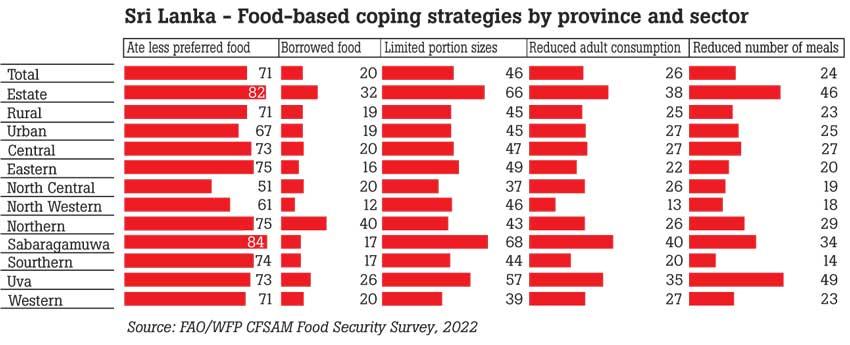15 Sep 2022 - {{hitsCtrl.values.hits}}

An increasing number of households are using a variety of strategies to cope with the reduced access to and availability of food resulting from the current economic crisis, the Food and Agriculture Organisation (FAO) and World Food Programme (WFP) mission report revealed. A survey carried out during June and July 2022 by the FAO and WFP found that about 61.1 percent of the households were regularly using food-based coping strategies, as they did not have enough food or money to fulfil the basic nutritional needs.
This included about one in every four households (24.2 percent) reporting that they had been reducing the number of meals consumed in a day and nearly half (46.2 percent) reporting that they had been limiting the portion sizes, the mission report highlighted.
Nearly four in every five households (79.1 percent) in the estate sector were regularly using food-based coping strategies. Large households (with more than seven members), those with a member having a disability as well as those whose main source of income was unskilled labour, were using food-based coping strategies at a similar rate.
In addition to adjusting their food consumption patterns, the mission also found that the households are using livelihood-based coping strategies as well. Such strategies include spending savings, buying food on credit and borrowing money or pawning jewellery.
“Once these least severe strategies were exhausted, the households normally resorted to strategies with higher negative impact on their medium long-term capacity to generate income and their food security,” the mission report said.
The report highlighted that by June 2022, about 23 percent of the households were applying crisis or emergency strategies, including selling productive assets (such as farming equipment or vehicles), reducing essential healthcare expenses and withdrawing children from school. About 200,000 households (3.7 percent) were using emergency livelihood coping strategies.
07 Nov 2024 14 minute ago
07 Nov 2024 1 hours ago
07 Nov 2024 1 hours ago
07 Nov 2024 3 hours ago
07 Nov 2024 3 hours ago